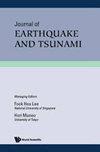伊朗钢弯矩连接近场地震荷载协议的发展
IF 2.1
4区 工程技术
Q2 GEOCHEMISTRY & GEOPHYSICS
引用次数: 0
摘要
钢框架建筑在伊朗和世界各地广泛使用。大地震的观测结果强调了抗震系统中梁柱连接的重要性及其对此类建筑性能的影响。由于发生在伊朗的最具灾难性的地震包含近场地震的特征,因此有必要了解这些地震下这些连接的行为。本研究提出了伊朗近场地震作用下特殊钢抗弯矩框架体系的加载方案。每层均有23个损伤半循环,最大层间漂移为0.065弧度。对提出的加载方案进行了数值比较。选择影响最大的加载协议作为主加载协议,因为它对连接的破坏性最大。与其他国家相关的近场地震加载方案(如SAC和Fang等)相比,主加载方案在前加载阶段显示出更快的塑性应变增长速度和最大的耗散能。本文章由计算机程序翻译,如有差异,请以英文原文为准。
Development of Near-Field Earthquake Loading Protocols for the Steel Moment Connections in Iran
Steel moment frame buildings are widely used in Iran and around the world. The observations from major earthquakes underscored the importance of the beam-to-column connections in seismic force-resisting systems and their influence on such building’s performance. Since the most catastrophic earthquakes that occurred in Iran contained the characteristics of near-field earthquakes, hence understanding the behavior of these connections under such earthquakes is needed. This study proposed loading protocols for special steel moment-resisting frame systems under near-field earthquakes in Iran. Each of them had 23 damage half-cycles with a maximum inter-story drift of 0.065 radians. The proposed loading protocols were compared numerically to each other. The most influential one was chosen as the main loading protocol since it has the most destructive effect on the connection. The main loading protocol showed a faster rate of increase in the plastic strain and imposed the highest amount of dissipated energy at a former loading stage compared to other near-field earthquake loading protocols related to other countries such as SAC and Fang et al.
求助全文
通过发布文献求助,成功后即可免费获取论文全文。
去求助
来源期刊

Journal of Earthquake and Tsunami
地学-地球化学与地球物理
CiteScore
2.60
自引率
13.30%
发文量
38
审稿时长
>12 weeks
期刊介绍:
Journal of Earthquake and Tsunami provides a common forum for scientists and engineers working in the areas of earthquakes and tsunamis to communicate and interact with one another and thereby enhance the opportunities for such cross-fertilization of ideas. The Journal publishes original papers pertaining to state-of-the-art research and development in Geological and Seismological Setting; Ground Motion, Site and Building Response; Tsunami Generation, Propagation, Damage and Mitigation, as well as Education and Risk Management following an earthquake or a tsunami.
We welcome papers in the following categories:
Geological and Seismological Aspects
Tectonics: (Geology - earth processes)
Fault processes and earthquake generation: seismology (earthquake processes)
Earthquake wave propagation: geophysics
Remote sensing
Earthquake Engineering
Geotechnical hazards and response
Effects on buildings and structures
Risk analysis and management
Retrofitting and remediation
Education and awareness
Material Behaviour
Soil
Reinforced concrete
Steel
Tsunamis
Tsunamigenic sources
Tsunami propagation: Physical oceanography
Run-up and damage: wave hydraulics.
 求助内容:
求助内容: 应助结果提醒方式:
应助结果提醒方式:


